Key takeaways:
- Establishing trust and open communication is vital for effective mentoring, allowing mentees to feel safe and empowered to express themselves.
- Setting clear, measurable goals collaboratively helps mentees feel less overwhelmed and increases their confidence in achieving tasks.
- Providing constructive feedback with a focus on growth and specific guidance transforms challenges into opportunities for improvement and motivation.
- Encouraging professional development through initiatives like ‘Learning Hour’ fosters a culture of ownership and aligns mentoring with individual career aspirations.
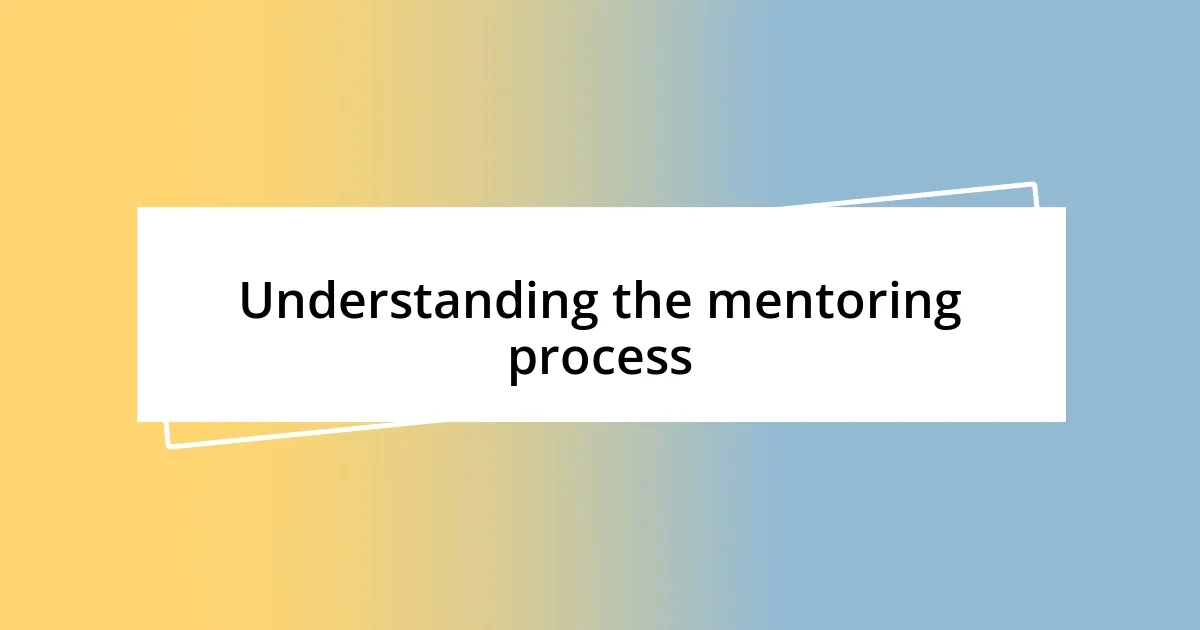
Understanding the mentoring process
Understanding the mentoring process is like navigating a journey where both the mentor and mentee grow together. I remember my first mentoring experience; I was nervous, unsure if I would be able to guide someone effectively. But as I listened and shared my experiences, I realized that vulnerability in a mentor’s role can actually foster a deeper connection.
One of the key aspects of mentoring is establishing trust. Think about it: how can someone genuinely learn if they don’t feel safe to ask questions or admit their uncertainties? I once had a mentee who hesitated to speak up in meetings. By encouraging an open dialogue and sharing my own struggles, I helped them find their voice, and watching that transformation was incredibly rewarding.
The mentoring process is also about setting realistic goals together. Have you ever set out to achieve something without a clear plan? It can feel overwhelming. I often sit down with my mentees to map out their objectives, breaking them into manageable steps. This collaborative approach not only empowers them but also creates a shared sense of accomplishment as they advance on their journey.
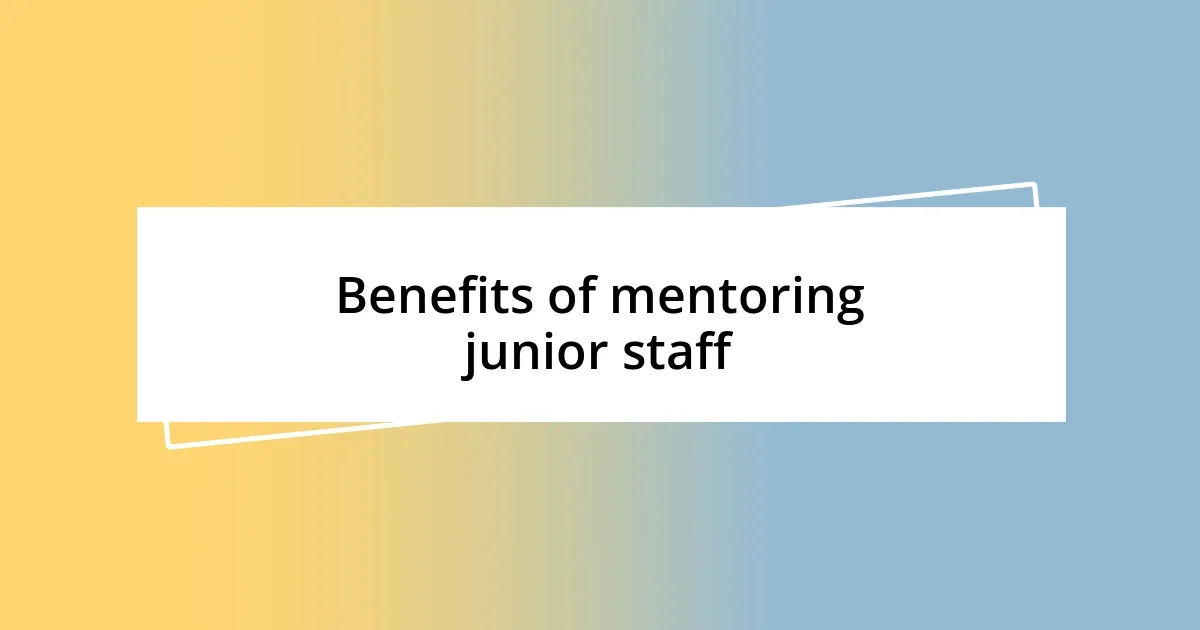
Benefits of mentoring junior staff
Mentoring junior staff brings a multitude of benefits, both for the mentor and the mentee. From my experience, one significant advantage is the opportunity to enhance the mentor’s leadership skills. I recall working with a junior team member who had remarkable potential but lacked direction. By guiding them, I found myself honing my ability to communicate effectively and make strategic decisions, which not only benefited my mentee but also elevated my own professional growth.
Another key benefit is the fresh perspective that junior staff bring to the table. When I mentored a new employee last year, their innovative ideas made me reconsider some of our traditional approaches. It was a refreshing experience that opened my eyes to new possibilities, and I realized that mentoring isn’t just a one-way street; it’s an exchange of knowledge that fuels creativity on both sides.
The emotional rewards of mentoring cannot be overlooked either. Mentoring provides a sense of accomplishment as you witness the growth and success of your mentees. I can’t help but smile when I see them achieving their goals, knowing I played a part in their journey. There’s something profound about seeing someone flourish, and it motivates me to continue investing my time in mentoring others.
| Benefit | Description |
|---|---|
| Skill Development | Mentoring enhances leadership and communication skills for both mentor and mentee. |
| Fresh Perspectives | Junior staff bring new ideas that challenge traditional practices, fostering innovation. |
| Personal Fulfillment | Helping others grow creates a profound sense of accomplishment and connection. |

Essential qualities of a mentor
One of the most critical qualities a mentor should possess is empathy. I recall a time when I was mentoring a junior staff member who was grappling with balancing work and personal commitments. I made it a point to listen and understand their struggles without judgment. This genuine empathy helped them feel supported and motivated to focus on their growth. A mentor must walk in the shoes of their mentees to truly understand their perspectives.
Additionally, strong communication skills are essential. A mentor should articulate ideas clearly and adapt their style to match their mentee’s needs. I’ve found that when I consciously adjust my communication—sometimes being more direct or, at other times, offering gentle guidance—it creates a more effective learning atmosphere. Here are some other vital qualities that every mentor should possess:
- Patience: Growth takes time, and a mentor needs to be patient as their mentee navigates challenges.
- Adaptability: Different mentees require different approaches. Being flexible is key to effective mentoring.
- Encouragement: A good mentor inspires confidence, nudging their mentees to take risks and step outside their comfort zone.
- Expertise: While it’s not necessary for a mentor to have all the answers, a solid foundation of knowledge in the relevant field is crucial for providing valuable insights.
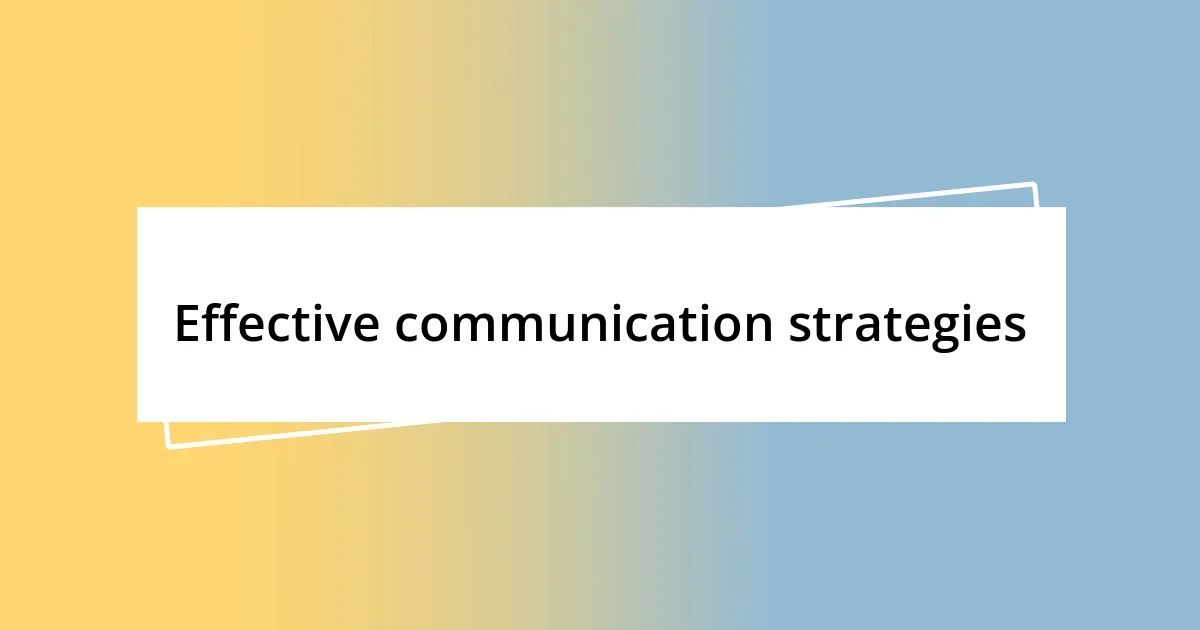
Effective communication strategies
Effective communication is at the heart of successful mentoring. I remember a situation where a junior staff member struggled to grasp a complex project. By breaking down the information into bite-sized pieces and using relatable analogies, suddenly everything clicked for them. This taught me that sometimes, it’s not just about what we say but how we say it that can make all the difference.
Building a rapport with your mentee is another crucial strategy. I often start our conversations with open-ended questions about their goals and interests. This not only shows that I care about their aspirations but also helps create an environment where they feel safe to express their concerns and ideas. It struck me how essential it is to foster that trust—without it, honest communication is nearly impossible.
Lastly, I have found that active listening plays an invaluable role in mentoring. When I genuinely listen to what my mentees are saying—without planning my response while they speak—I can respond more thoughtfully. For instance, during a recent mentoring session, I paused to reflect on a junior colleague’s feedback before diving in with my thoughts. This moment of silence not only showed I valued their input but also encouraged them to elaborate, creating a richer discussion. Isn’t it amazing how sometimes just being present can open up whole new avenues of dialogue?
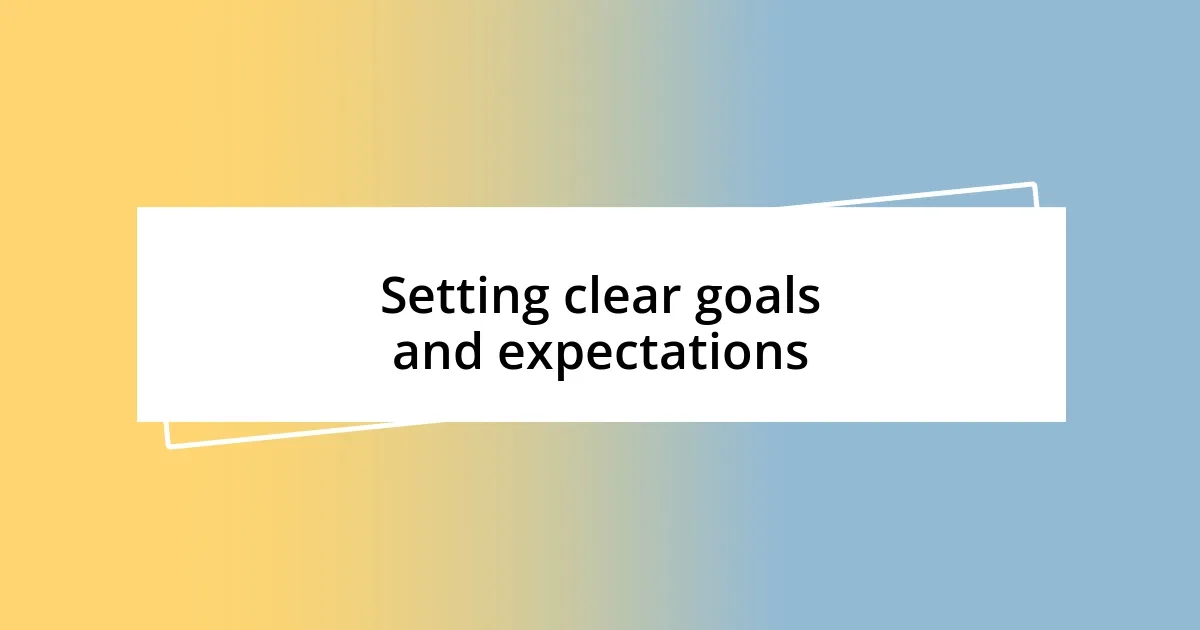
Setting clear goals and expectations
Setting clear goals and expectations is foundational for any mentoring relationship. I remember mentoring a junior staff member who was feeling overwhelmed with their tasks. Together, we laid out specific, measurable goals, breaking them into manageable milestones. This not only provided clarity but also turned what felt like an insurmountable workload into achievable stepping stones. Isn’t it fascinating how a clear roadmap can alleviate anxiety and boost confidence?
When setting expectations, I find that I need to be transparent about both my expectations and theirs. In one instance, I sat down with a mentee and discussed what success looked like for their current project. It was eye-opening to realize that their vision of success differed from mine. We navigated these differences together, and by aligning our goals, we fostered a sense of shared ownership in their progress. How often do we assume everyone is on the same page, only to discover different interpretations later?
Finally, I believe it’s essential to revisit those goals regularly. In my experience, I’ve seen how checking in can keep the momentum going. I once had weekly sessions with a mentee where we evaluated their progress and adjusted goals when necessary. These meetings became a safe space for open dialogue, allowing them to express challenges and celebrate wins, no matter how small. It’s incredible how those regular conversations can strengthen the mentor-mentee bond while ensuring everyone stays focused and motivated.

Providing constructive feedback
Providing constructive feedback is a delicate balance of honesty and encouragement. I remember a time when I had to give tough feedback to a junior staff member who had missed several important deadlines. Instead of just listing what went wrong, I focused on what they could improve. We explored strategies together, transforming what could have been a demoralizing conversation into a collaborative problem-solving session. Isn’t it remarkable how reframing feedback can empower rather than discourage?
It’s crucial to deliver feedback in a way that prioritizes the individual’s growth. There was an instance where a mentee was struggling with their presentation skills. Instead of merely pointing out flaws, I highlighted their strengths first and then gently outlined areas for improvement. This approach not only made the feedback easier to digest, but it also motivated them to pursue those improvements. Have you ever noticed how framing feedback positively can change someone’s entire outlook?
Specificity is key in constructive feedback. I learned this firsthand when I provided vague suggestions to a mentee working on a digital marketing project. They seemed confused and unsure of their next steps. After realizing this, I began giving detailed guidance, pointing to particular metrics or examples for improvement. The change was immediate; suddenly, they had clear direction and regained their confidence. It’s so powerful to see how actionable feedback can transform uncertainty into clarity, don’t you think?
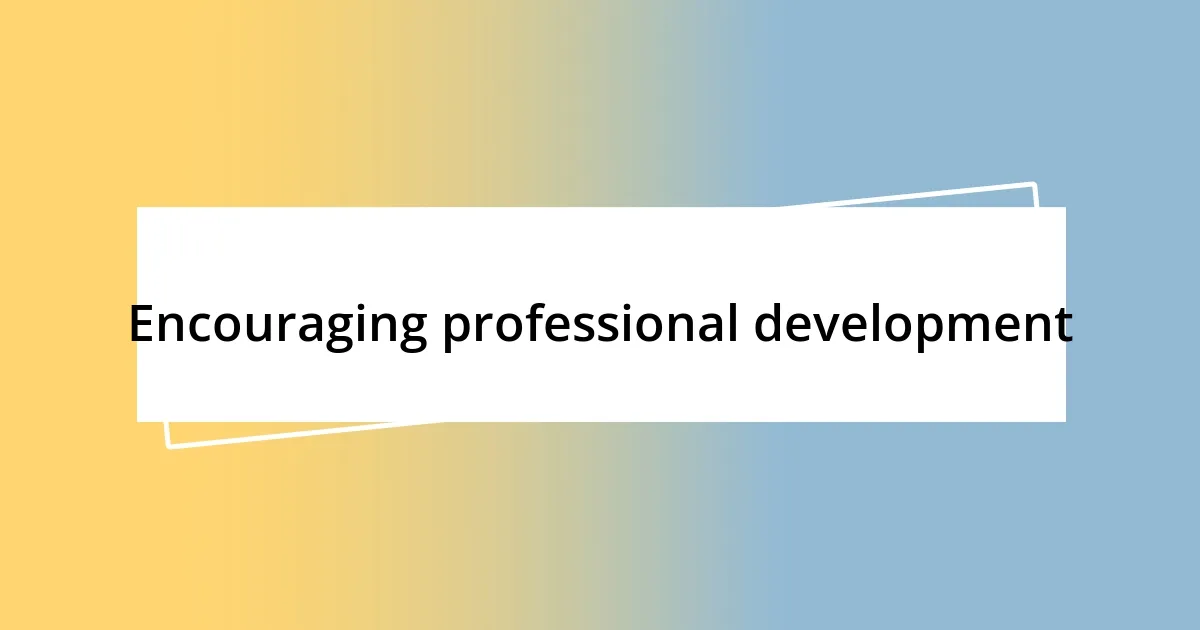
Encouraging professional development
Encouraging professional development is all about creating an environment where learning and growth flourish. I vividly remember introducing a weekly “Learning Hour” for my team. During these sessions, I encouraged junior staff to bring topics they were passionate about, whether it was a new software tool or a recent industry trend. It was amazing to witness their excitement and how they began to take ownership of their learning paths. Isn’t it invigorating when individuals feel empowered to lead their development?
Another key aspect I’ve discovered is the importance of mentorship beyond just skill building. One time, a mentee confided in me about their aspirations to transition into a management role. Instead of solely focusing on technical skills, we explored leadership theories and best practices. We even arranged for them to shadow a manager for a day, which ignited a spark of ambition in them. How often do we miss the opportunity to support our staff in ways that align with their career goals?
I also emphasize the value of feedback in the professional development journey. I recall a junior staff member who was hesitant to ask questions, fearing it would make them appear inadequate. By normalizing questions and presenting them as a sign of engagement rather than weakness, I saw a shift in their confidence. Soon, they were not only asking questions but also sharing insights with the entire team. Isn’t it inspiring when staff go from uncertainty to becoming advocates for learning within the workplace?














